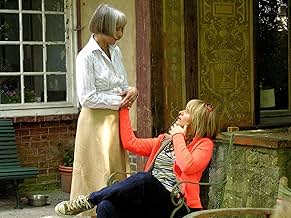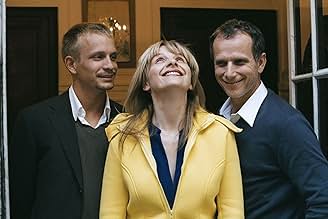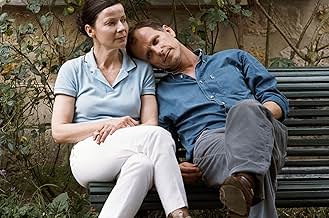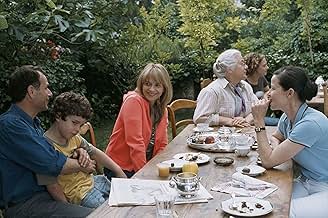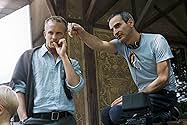VALUTAZIONE IMDb
7,1/10
8476
LA TUA VALUTAZIONE
Due fratelli e una sorella assistono alla scomparsa dei loro ricordi d'infanzia quando devono rinunciare ai beni di famiglia per assicurarsi la successione della madre defunta.Due fratelli e una sorella assistono alla scomparsa dei loro ricordi d'infanzia quando devono rinunciare ai beni di famiglia per assicurarsi la successione della madre defunta.Due fratelli e una sorella assistono alla scomparsa dei loro ricordi d'infanzia quando devono rinunciare ai beni di famiglia per assicurarsi la successione della madre defunta.
- Premi
- 9 vittorie e 23 candidature totali
Recensioni in evidenza
Up until now, you may have seen films that are told through the eyes of a specific character, a child or even a dog. However this film achieves the impossible, it tells the story of generations through the eyes of the objects! The film opens with a large family gathering in a gorgeous old house located in French countryside. The house lies in the middle of a large garden and hosts beautiful antique furniture the owner, mother of three middle aged children, inherited from her uncle. A year later, she dies and the children have to decide about the fate of the house and the furniture.
Anyone who has lost a parent or an elder family member possibly has gone through these difficulties depicted so naturally in the film. However, the movie goes beyond the initial thoughts and feelings. Delicate questions asked by this movie are multifaceted and explore the effects of capitalist globalization on generations.
Those objects have memories in them. When they are left to a museum, they seemingly belong to the society as whole but to no one at the same time.
The elder brother, professor of economy, who lives in France wants to preserve the house, he wants to stick to his roots, to family memories but his brother and sister want to follow their careers in China and US. Yes, by doing so they live in the moment and yes, they are not confined to France and yes, the whole world is theirs but they are also left with nothing. Like objects displayed in the museum.
And this duality lives on until the ironic ending, which can be interpreted as optimistic or pessimistic by viewers even tough pessimistic tone is definitely more prevalent.
Beautiful acting by Binoche, Charles Berling, Edith Scob and wonderful directing and writing by Assayas. This movie is just lifelike, simple but complex!
Anyone who has lost a parent or an elder family member possibly has gone through these difficulties depicted so naturally in the film. However, the movie goes beyond the initial thoughts and feelings. Delicate questions asked by this movie are multifaceted and explore the effects of capitalist globalization on generations.
Those objects have memories in them. When they are left to a museum, they seemingly belong to the society as whole but to no one at the same time.
The elder brother, professor of economy, who lives in France wants to preserve the house, he wants to stick to his roots, to family memories but his brother and sister want to follow their careers in China and US. Yes, by doing so they live in the moment and yes, they are not confined to France and yes, the whole world is theirs but they are also left with nothing. Like objects displayed in the museum.
And this duality lives on until the ironic ending, which can be interpreted as optimistic or pessimistic by viewers even tough pessimistic tone is definitely more prevalent.
Beautiful acting by Binoche, Charles Berling, Edith Scob and wonderful directing and writing by Assayas. This movie is just lifelike, simple but complex!
This is a haunting film about the distorting effects of monetary exchange on family life and the cohesion of society. It will give food for thought to anyone with elderly parents who may have accumulated a few works of art during their lifetime. At a time of grief, the bereaved have difficult questions to answer. The film-goer is left wondering, "What would I have done if I had been in a similar situation?" It is not a film to be quickly forgotten. Although the issue of the fate of the family's country house may be a specifically French theme, others dealt with are more universal and have a deep resonance for anyone with elderly relations. Juliette Binoche may be the name that draws film-goers in, but there is fine acting from all the performers.
Hélène Berthier, niece of a famous painter, receive her children and grand children for her birthday, and take this opportunity to talk about her death, and what will happen to her uncle's collection. Once dead, Frederic, her elder son think that they'll keep the house as it his, but his brother and sister don't live in France anymore and think that it would more intelligent to sell. When I was expecting the family to be destroyed around this heritage, nothing like that happens, they all accept and the rarity in the 21 century of families having things that could belong to museums takes an end. This film is extremely beautiful, for many reasons. First because it can touch everyone who lost someone and saw what was theirs, being sold and put in many places. Then this film is beautiful because it shows also how everyone accepts that but also suffers from what they can't keep together: family, past, heritage! To me it shows better than any Amelie, or La Vie en Rose what being French means: being thorn between the heritage of a culture and an appeal of modernity, wanting to keep your roots alive and spread toward the world. This is funny how this thought came through my mind "Why do they want to live in Beijing or New York?" suddenly being in the film, that seemed weird to me when I just lived two years and a half in London, and probably won't stay in my old country forever. The actors are great, Edith Scob playing the extremely classy Hélène, and Charles Berling, Jeremy Regnier and Juliette Binoche are very touching and human. It's important to say, that the object are also characters in this story, and it's scary at the end to see them in the museum d'Orsay, how they lost life or are recovering some. It's important to say that this film was a project with the museum, and I think that it is brilliant to make us pay attention to the details of these objects when generally we're not. Question: is art made for museum or to live with it? People wouldn't try to steal them from museum if the answer was museums
If you want to see my other critics: http://www.silverparticules.blogspot.com
Interesting, gentle sad (but not depressing) story of the inevitability of loss and chance.
Three siblings decide whether to keep or sell their mother's country home and art collection after her death, exploring how we give 'things' meaning, and how that meaning changes due to context, generation, and what we need from them.
But while the ideas are intriguing, and the acting good it never quite reached the deepest level of feeling or thoughtfulness for me.
Called a masterpiece by a number of critics, and something close by others, I cant quite go there, but it is an intelligent, quietly moving experience, that I'll probably revisit yet again, since it grew on me on a second viewing.
Three siblings decide whether to keep or sell their mother's country home and art collection after her death, exploring how we give 'things' meaning, and how that meaning changes due to context, generation, and what we need from them.
But while the ideas are intriguing, and the acting good it never quite reached the deepest level of feeling or thoughtfulness for me.
Called a masterpiece by a number of critics, and something close by others, I cant quite go there, but it is an intelligent, quietly moving experience, that I'll probably revisit yet again, since it grew on me on a second viewing.
My only previous Assayas' approach is Maggie Cheung's Cannes BEST ACTRESS nabbing feature CLEAN (2004, 7/10), and for most Chinese media, Assayas seems to alway been in an ill-fated personage as Maggie's ex-husband. But his works matures splendidly with finesse and sobriety (from CLEAN to SUMMER HOURS), the latter resounds a similar pace of meditation and quietude as Hirokazu Koreeda's STILL WALKING (2008, 8/10), tackles with a slice of family life, with a contemplation towards the domestic heredity, globalized opportunism, alienated generations and art conservation.
In dealing with a sentimental demise of a bourgeoisie matriarch, who resides in a suburban villa near Paris with all her uncle's art menagerie and his worthwhile sketching books (apparently he was a renowned painter himself and an unspeakable family secret), Assayas infills an indefatigable stamina to keep all the delicate matters in a civil restraint, the contradiction abounds among three siblings in regard to keep or sell the villa; and the proceedings of donating valuable art pieces has also been a bumpy road; for the elder son, he also has teenage children to worry about, and last but not the least, his abiding remembrance of the past is the most poignant blow to one who can fit into his shoes under the circumstances.
The show has never been slid into a thespians' melodrama notwithstanding the fact that its indulgence of a top-billing Gallic cast, a blonde Binoche incarnates a very light-touch casualness as the metropolitan daughter, living in USA and dedicates herself more in bringing the work of art abroad for the international exposure; Renier, the younger son, finds both an opportunity in settling down in China and an exigent situation in which the profit of selling the villa couldn't come as timely as possible. While these two are soon-to-be-goners, without a pinch yearning for their homeland, the liability all falls on the elder brother (Berling), whose true-to-life embodiment of his character anchors the film's backbone in a concrete formality, it is a prickly situation will come about to anyone eventually. Edith Scob, as the deceased mother, whose first 30-minutes appearance contrives to establish herself as an indomitable shadow encroached by the past, when she is gone, something else will be taken with her together and forever, Scob is pitch perfect in her role's demanding of the physical infirmity, an unswerving mind of knowing her time is up and the duty as a bequeather.
I have not conceal my preference to this quiet, reflective lifelike imitation than other more grandstanding razzle-dazzle, it is a simple film with a concise message delivered eloquently by the mastery of Assayas who auspiciously shoulders on the privilege of an auteur not only in the French terrain, but also as an international landmark, like many of his precedent compatriots.
In dealing with a sentimental demise of a bourgeoisie matriarch, who resides in a suburban villa near Paris with all her uncle's art menagerie and his worthwhile sketching books (apparently he was a renowned painter himself and an unspeakable family secret), Assayas infills an indefatigable stamina to keep all the delicate matters in a civil restraint, the contradiction abounds among three siblings in regard to keep or sell the villa; and the proceedings of donating valuable art pieces has also been a bumpy road; for the elder son, he also has teenage children to worry about, and last but not the least, his abiding remembrance of the past is the most poignant blow to one who can fit into his shoes under the circumstances.
The show has never been slid into a thespians' melodrama notwithstanding the fact that its indulgence of a top-billing Gallic cast, a blonde Binoche incarnates a very light-touch casualness as the metropolitan daughter, living in USA and dedicates herself more in bringing the work of art abroad for the international exposure; Renier, the younger son, finds both an opportunity in settling down in China and an exigent situation in which the profit of selling the villa couldn't come as timely as possible. While these two are soon-to-be-goners, without a pinch yearning for their homeland, the liability all falls on the elder brother (Berling), whose true-to-life embodiment of his character anchors the film's backbone in a concrete formality, it is a prickly situation will come about to anyone eventually. Edith Scob, as the deceased mother, whose first 30-minutes appearance contrives to establish herself as an indomitable shadow encroached by the past, when she is gone, something else will be taken with her together and forever, Scob is pitch perfect in her role's demanding of the physical infirmity, an unswerving mind of knowing her time is up and the duty as a bequeather.
I have not conceal my preference to this quiet, reflective lifelike imitation than other more grandstanding razzle-dazzle, it is a simple film with a concise message delivered eloquently by the mastery of Assayas who auspiciously shoulders on the privilege of an auteur not only in the French terrain, but also as an international landmark, like many of his precedent compatriots.
Lo sapevi?
- QuizThis film is part of the Criterion Collection, spine #513.
- BlooperGrandmother's two most valuable objects, the Corots, are hung where they'll both get lots of sunlight, guaranteed to damage the colors. Since once gets the definite impression that little in the house has changed over many years, these pictures would be toast by now.
- Colonne sonoreLoftus Jones
Written by Turlough O'Carolan
Performed by Robin Williamson, Mat Maneri and Barre Phillips
I più visti
Accedi per valutare e creare un elenco di titoli salvati per ottenere consigli personalizzati
- How long is Summer Hours?Powered by Alexa
Dettagli
- Data di uscita
- Paese di origine
- Siti ufficiali
- Lingue
- Celebre anche come
- Summer Hours
- Luoghi delle riprese
- La Saglière, 8 Rue de Parmain, Butry-sur-Oise, Val-d'Oise, Francia(the Berthiers' house)
- Aziende produttrici
- Vedi altri crediti dell’azienda su IMDbPro
Botteghino
- Budget
- 4.400.000 € (previsto)
- Lordo Stati Uniti e Canada
- 1.657.001 USD
- Fine settimana di apertura Stati Uniti e Canada
- 49.484 USD
- 17 mag 2009
- Lordo in tutto il mondo
- 7.835.857 USD
- Tempo di esecuzione1 ora 43 minuti
- Colore
- Mix di suoni
- Proporzioni
- 1.85 : 1
Contribuisci a questa pagina
Suggerisci una modifica o aggiungi i contenuti mancanti

Divario superiore
By what name was Ore d'estate (2008) officially released in India in English?
Rispondi







